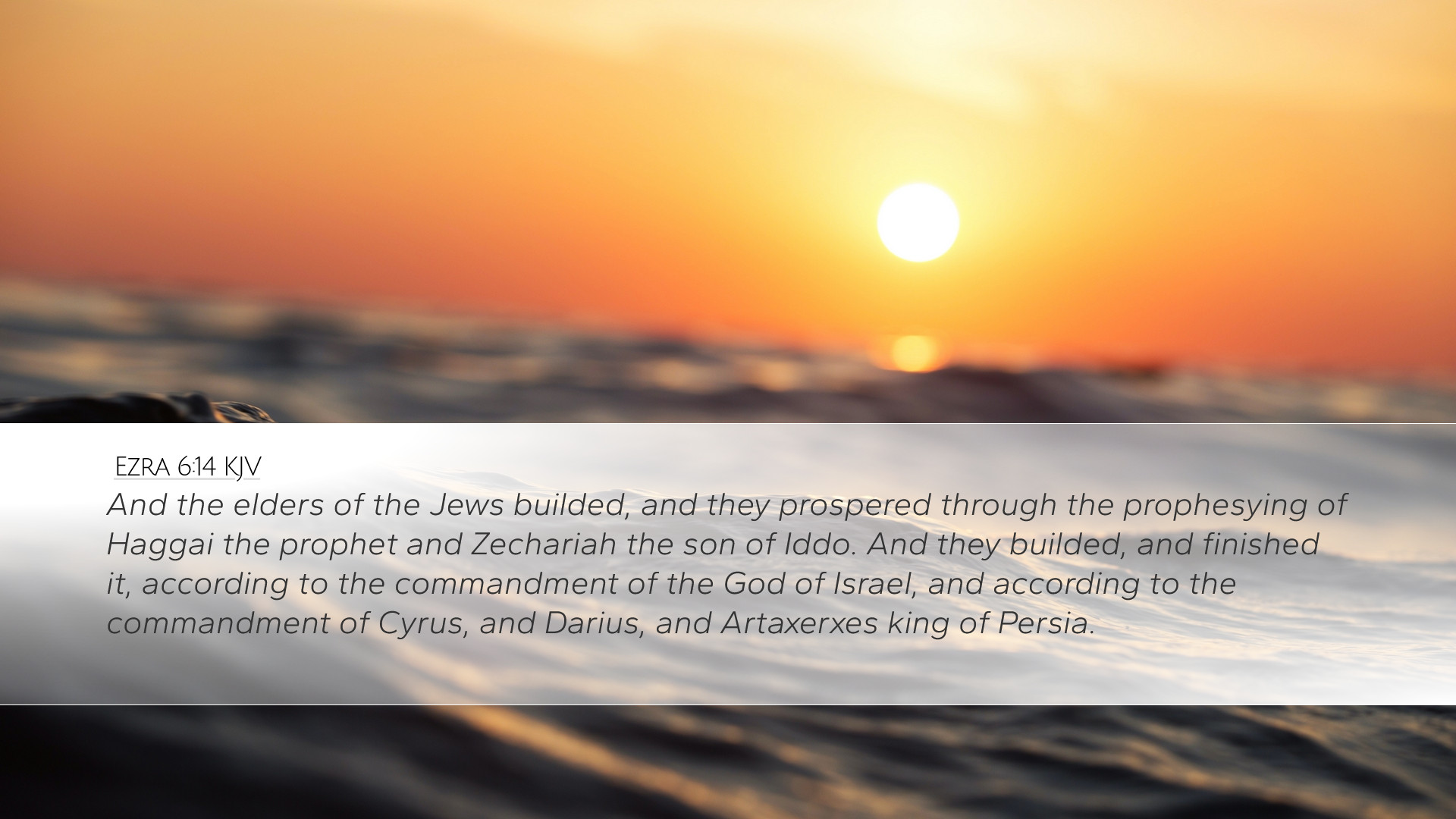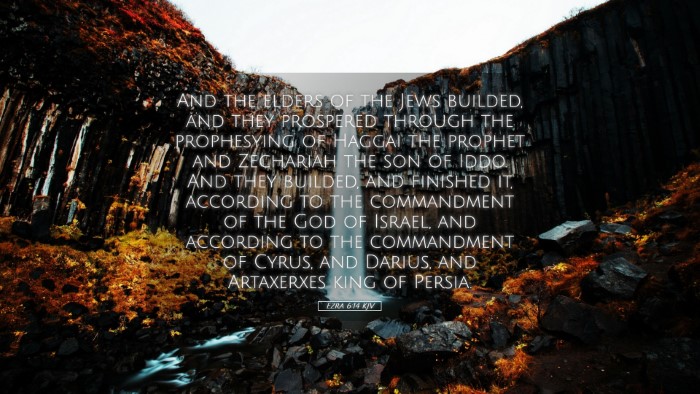Old Testament
Genesis Exodus Leviticus Numbers Deuteronomy Joshua Judges Ruth 1 Samuel 2 Samuel 1 Kings 2 Kings 1 Chronicles 2 Chronicles Ezra Nehemiah Esther Job Psalms Proverbs Ecclesiastes Song of Solomon Isaiah Jeremiah Lamentations Ezekiel Daniel Hosea Joel Amos Obadiah Jonah Micah Nahum Habakkuk Zephaniah Haggai Zechariah MalachiEzra 6:14
Ezra 6:14 KJV
And the elders of the Jews builded, and they prospered through the prophesying of Haggai the prophet and Zechariah the son of Iddo. And they builded, and finished it, according to the commandment of the God of Israel, and according to the commandment of Cyrus, and Darius, and Artaxerxes king of Persia.
Ezra 6:14 Bible Commentary
Bible Commentary on Ezra 6:14
Verse: Ezra 6:14 - "And the elders of the Jews built, and they prospered through the prophesying of Haggai the prophet and Zechariah the son of Iddo. And they built and finished it, according to the commandment of the God of Israel, and according to the commandment of Cyrus, and Darius, and Artaxerxes king of Persia."
Overview
This verse encapsulates a significant moment in the history of the Jewish people during their return from Babylonian exile. It highlights the successful rebuilding of the temple in Jerusalem, emphasizing the role of prophetic encouragement, divine commandment, and the political support from Persian kings. The commentary contributions from prominent theologians illuminate various aspects of this scripture.
Exegesis and Analysis
This verse can be subdivided for detailed exegesis. Several themes emerge through careful study.
- The Role of Prophecy: The mention of Haggai and Zechariah shows the importance of prophetic voices in guiding and encouraging the remnant of Israel. Both prophets urged the people not only to build the temple but also to restore their covenant relationship with God.
- Divine Sovereignty: The verse underscores that their success was not merely due to human effort but rooted in divine orchestration. God’s command was paramount, demonstrating that His plans prevail through human actions.
- Pagan Monarchs and God's Purpose: The involvement of Persian kings (Cyrus, Darius, and Artaxerxes) illustrates God’s ability to use even secular rulers to fulfill His purposes. These kings issued decrees that facilitated the rebuilding, showing how God’s providence transcends national boundaries.
Commentary from Historical Theologians
Matthew Henry’s Commentary
Matthew Henry emphasizes the prosperity of the Jewish elders in their task of rebuilding. He notes that their success was directly linked to their obedience and response to the prophetic ministry. Henry describes how the encouragement from Haggai and Zechariah reinvigorated the people, sparking a renewed zeal for God's house. Moreover, he points out that the elders not only built physically but spiritually; they re-established their identity as God's people.
Albert Barnes’ Notes on the Bible
Albert Barnes sheds light on the historical context around the rebuilding of the temple. He argues that the chronological proximity of the prophets’ ministry to the rebuilding efforts highlights the significance of divine encouragement. Barnes further discusses the mention of the kings and notes that the success in building the temple came about in accordance with God’s commandment, illustrating the harmony between divine directive and human agency.
Adam Clarke's Commentary
Adam Clarke focuses on the notion of divine assistance in the rebuilding process. He contends that the elders of the Jews possessed a specific divine providence that enabled them to succeed in their endeavors. Clarke interprets the prophecy as a catalyst for action and expresses that the elders' determination and adherence to divine instructions were critical for the completion of the temple. In Clarke’s view, the verse is not simply a historical account, but a testament to the faithfulness of God towards His people.
Theological Implications
- Faith in Action: This verse invites contemporary readers to reflect on the necessity of aligning their actions with divine will. The successful rebuilding of the temple serves as an analogy for spiritual restoration and active faith in the Church today.
- Encouragement from Prophetic Voices: Pastors and leaders today are called to listen to and act upon prophetic guidance which God still provides through His Word and the Holy Spirit.
- God's Sovereignty in Governance: The involvement of foreign kings in executing God’s plans illustrates that God works through all forms of authority. This reassures believers of God's control over political matters, suggesting divine sovereignty instills hope for today's challenges.
Application for Today’s Church
The implications of Ezra 6:14 are profound for pastors, students, theologians, and Bible scholars:
- Emphasize the importance of prophetic ministry and its role in nurturing faith and perseverance within the congregation.
- Encourage a holistic understanding of God’s sovereignty, recognizing His presence in societal structures and events.
- Foster initiatives that reflect a commitment to building both a physical church and a vibrant community of faith that mirrors God's glory in the world.
Conclusion
Ezra 6:14 serves as a reminder of how God effectively orchestrates the rebuilding and restoration of His people. By understanding the historical, prophetic, and divine layers of this scripture, contemporary believers are not only informed but inspired to pursue God’s calling with zeal and trust in His sovereign plans.


